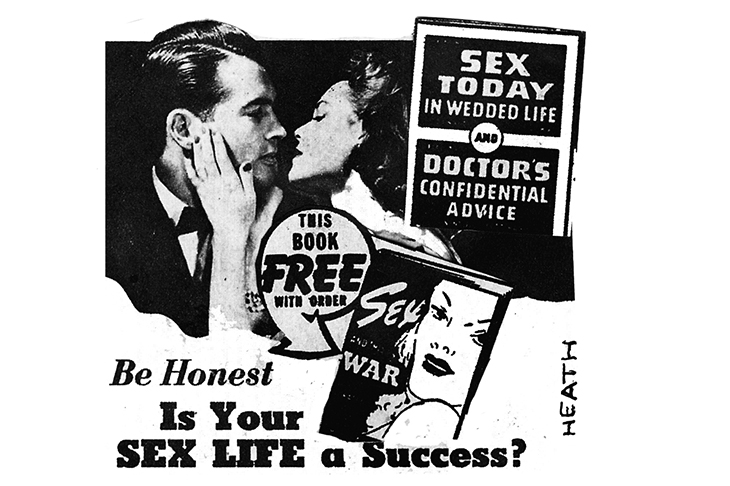I interviewed a prominent 1970s women’s liberationist recently and ended up discussing the sexual culture of her political heyday. ‘Everyone was sleeping with everyone,’ she said. ‘You had to have a good reason not to sleep with someone.’
I felt a stab of envy, a sharpened version of what I feel browsing black-and-white snaps from back in the day. There is often a disheveled sexiness. There are the gleefully knowing expressions from women newly unafraid of unwanted pregnancy, and the ‘why not?’ insouciance of slouching shaggy-haired men and their slender sheepskin-coated girlfriends leaning against doorposts.
What a dreary distance we’ve traveled to get to the present dating landscape. How pleasure-free it all seems as Valentine’s Day approaches. Dating apps and online porn have bred numbness and indifference.
The quality of sex is getting worse, but so is the quantity. Rates of sexual intercourse are plummeting across a relatively wide bracket of young people — including those meant to be having babies. In the US the birth-rate has fallen to a 30-year low. Meanwhile, Britain is in the middle of a ‘baby bust’ with births at below replacement level, according to a recent report by the Global Burden of Disease study published in the Lancet. Birth control is partly to blame — but so is the decline of any sense that sex is to be enjoyed.
Given our long history of loucheness, booze-fueled mischief and (since the 1960s) our famously liberal law, it’s just sad that there’s so little joy in 21st-century sex. What’s to blame?
One survey found that nearly half of Britons say their sex lives are derailed by ‘stress’. But perhaps the real trouble is that young and youngish people are more obsessed with smartphones than with each other. Even teens, meant to be the horniest demographic of all, would rather — according to the British Pregnancy Advisory Service — stay in and sext than go out and spend time with another human being.
This tallies with my observations, too. Most of the single men one encounters on and offline have by now spent their formative years swiping their way through disposable connections and seem jaded rather than excited by the prospect of meeting a woman. Tinder logs 1.6 billion swipes a day worldwide, but only 26 million ‘matches’.
Kate, a single friend of mine, illustrates the problem well. She is 37, attractive and good at her job (she works in intelligence). She speaks three European languages and plays the piano to near-professional standard. Her value should be high. Yet her romantic life is a swamp of false starts, sudden cancelations, mystery disappearances, gaslightings and ghostings. Plenty of men express an interest via text, but she almost never goes on a date. Her ‘matches’ prefer to message her at leisure via WhatsApp but never seem to want to meet up.
‘What are these men getting out of all this rubbish?’ she said last week. ‘They’re not even getting sex!’
To make matters worse, sexual ‘wokeness’ is on the rise. Identity politics has sucked the life from the dating scene. The #MeToo movement may have urged women to speak up, but now it’s men who are most vocal about their wants and needs. Dating sites teem with guys, mostly in their thirties, pompously signaling their politics and their preferences, in the interest of ‘openness and honesty’.
Take ‘ethical polyamory’. This is a new take on the old ‘open relationship’, and it allows for multiple sexual partners. At dinner parties, I now encounter ‘ethical polyamorists’ (mostly men) who explain why they prefer to have multiple girlfriends at once. It’s not being a cad or a flake, it’s their identity, they say — and who am I to question it?
I try to keep an open mind. Last month, I chatted to a ‘poly’ man on Bumble because he made interesting documentaries. Before long I was treated to a WhatsApp treatise on how he embraced polyamory because of his ‘love for women’ (and himself). His desire to protect women from ‘getting hurt’ was paramount, he said. I quickly extracted myself.
More recently, while browsing OkCupid, my eye was caught by a handsome-ish man I’ll call Dave. Clicking on his profile, I was confronted with a 3,000-word essay detailing his sexual preferences and ‘ethics’, informed by something called ‘radical candor’. Dave’s candor was indeed so radical it was blatantly antithetical to romance or even erotic potential. ‘I want things [that include] kink, group play, burner things, etc,’ he wrote. Then there was a note about ‘principles and ideals’ before he dived into a list of partner requirements: she must be ‘comfortable with group play, public play… play parties, things like Killing Kittens, Torture Garden, etc… dom/sub play and most other kinds of things.’ Is it any wonder that so few people are having sex?
We may seem to have more choice than ever, but what good is that if nothing pleasant or meaningful comes of it? The sexual landscape has become arid. We have freedom like never before, and yet our choices have never felt more sparse.
This article was originally published in The Spectator magazine.


















